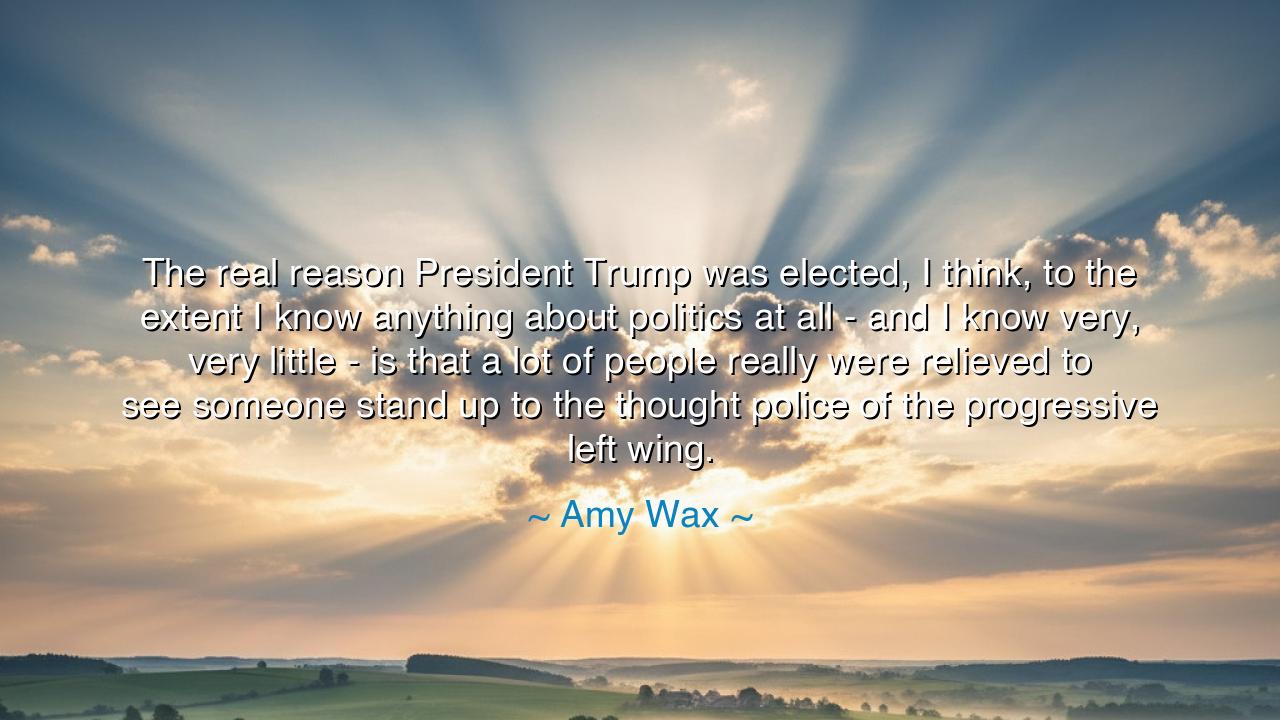
The real reason President Trump was elected, I think, to the
The real reason President Trump was elected, I think, to the extent I know anything about politics at all - and I know very, very little - is that a lot of people really were relieved to see someone stand up to the thought police of the progressive left wing.






O children of the future, listen to the words of Amy Wax, who, with a voice that cuts through the complexity of modern politics, speaks of a great truth. "The real reason President Trump was elected, I think, to the extent I know anything about politics at all - and I know very, very little - is that a lot of people really were relieved to see someone stand up to the thought police of the progressive left wing." In these words, she acknowledges the deep yearning of many for a voice that challenges the ever-tightening grip of societal expectations and the forces of conformity. It is the cry of those who feel silenced, pushed to the edges of political discourse by the progressive winds of change.
In the ancient world, there were those who, like Socrates, dared to stand against the prevailing norms and challenge the very thoughts of their time. Socrates, the philosopher, often found himself at odds with the Athenian authorities who sought to control the intellectual and moral fabric of society. His questions and his method of challenging what was considered accepted truth earned him the ire of the powerful, and in the end, he was condemned to death. Yet, like Trump in Wax’s statement, Socrates represents the voice of dissent, the force that dares to question the established order, regardless of the consequences. His story reminds us that challenge to the prevailing thought is an ancient and enduring tradition, a vital force for the growth of civilization.
The tale of Galileo Galilei further echoes this theme. When Galileo proclaimed that the Earth revolved around the Sun, defying the Church's teachings, he, too, stood in defiance of the thought police of his time. The church, which held immense power over the intellectual landscape, sought to suppress his revolutionary ideas, branding him a heretic. Yet, Galileo’s pursuit of truth and his refusal to bow to oppressive forces reshaped the way humanity saw the universe. In the same way, Trump, for all his flaws, became a figure that some saw as challenging the ideological constraints of the progressive left wing, which many felt had become a new force of intellectual conformity.
Even in more modern times, we see the rise of figures who represent the breaking of intellectual shackles. The civil rights movements in the 20th century, led by Martin Luther King Jr., were a direct response to a society that sought to suppress the rights and voices of Black Americans. In that struggle, there were those who felt the pressures of societal forces pushing them to conform to outdated views of race and justice. King’s powerful words and actions did not seek to destroy his adversaries but to challenge the norms that had been imposed upon him and his people. Just as King stood against the forces of oppression, some view Trump’s election as a challenge to the perceived oppression of progressive thought.
O children, let us recognize the eternal tension between the forces of conformity and rebellion, between those who seek to enforce their worldview and those who dare to challenge it. Whether in the time of Socrates, Galileo, or in the modern age, there are always those who rise to question the established order, to speak out against the forces of intellectual uniformity. In Amy Wax’s words, we hear the voice of those who, like Trump, resist the thought police—a resistance that has existed throughout the ages. Yet, we must remember that true progress comes not through blind adherence to any side, but through the constant questioning and testing of our beliefs. May we honor the wisdom of those who stand for the truth, regardless of the pressures of the times.






THDoan Thi Thanh Huyen
Amy Wax’s take on President Trump’s election highlights how certain segments of society felt that their voices were being silenced by what they saw as the 'thought police' of the progressive left. This idea of political correctness is deeply polarizing, but it makes me wonder—do we risk losing the ability to have nuanced conversations if we focus too much on being 'politically correct'? How can we encourage open dialogue without turning every disagreement into a battle over who is right or wrong?
NNBao Ngan Nguyen
Amy Wax’s comment about President Trump’s appeal touches on a larger issue regarding political correctness and the backlash it often creates. I can see why some people felt relieved by Trump’s candid, often controversial statements. However, I question whether pushing back against political correctness can also lead to the dismissal of important social issues. Is it possible to criticize 'thought police' without undermining the progress that’s been made on equality and inclusion?
KTQuang khai Tran
This quote brings attention to a significant divide in American politics, where people see 'thought police' as an overreach by the progressive left. But it also makes me think—how much of this division is based on misunderstanding or exaggeration? Could there be a middle ground where people are encouraged to express their views freely without fear of retribution, while still promoting inclusivity and respect for others?
DDhoang duc duy
Amy Wax’s perspective on why President Trump was elected highlights the frustration that some people feel about political correctness and the progressive left. It raises an interesting point about the tension between free speech and social responsibility. But I wonder—does the desire to 'stand up' to perceived political correctness sometimes lead to harmful rhetoric or actions? Where do we draw the line between challenging 'thought police' and fostering respect for diverse opinions?